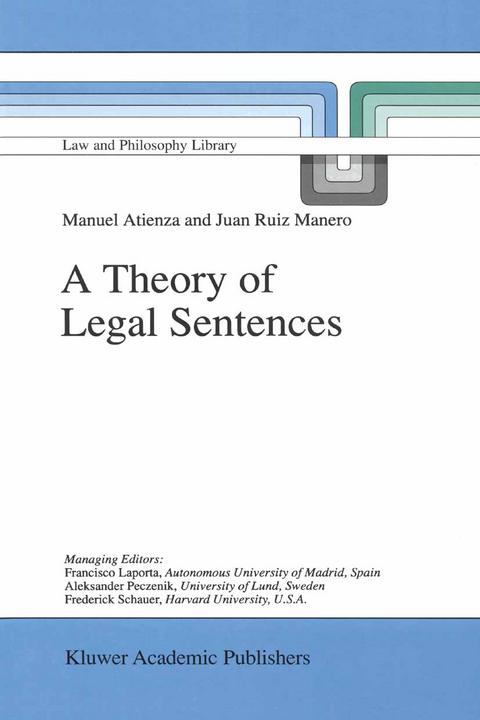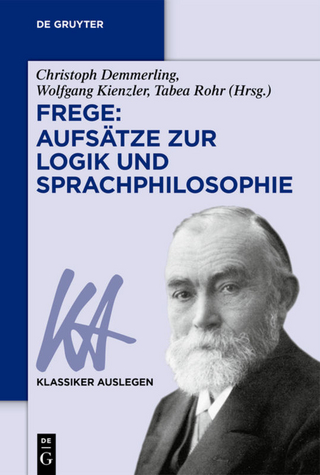
A Theory of Legal Sentences
Springer (Verlag)
978-0-7923-4856-6 (ISBN)
Legal statements are, according to the authors, the most basic elements of the law. Nevertheless they must be considered not only as the pieces of a puzzle, but also as the components of a dynamic and highly complex reality: the law of contemporary society. The book presents an analysis of the different types of legal statements (mandatory rules, principles, power-conferring rules, definitions, permissions, values and the rule of recognition) from a threeefold perspective, that is, considering their logical structure, their function in legal reasoning as reasons for action, and their connections with the interests and power relationships among the individuals and the social groups. The result is conceived as a first step in the building of a general theory of law designed not as an isolated discourse but as a decisive element for the dynamization of the legal culture.
I: MANDATORY NORMS : PRINCIPLES AND RULES.- 1. Introduction. Types of principles.- 2. Principles and rules.- 3. The explanatory, the justificatory and the legitimatory dimension of principles.- APPENDIX TO CHAPTER I: REPLY TO OUR CRITICS.- 1. Mandatory rules as peremptory reasons, and principles as non-peremptory reasons; the ‘closed’ or ‘open’ configuration of the conditions of application.- 2. Principles and full compliance.- II: POWER-CONFERRING RULES.- 1. Introduction.- 2. What power-conferring rules are not.- 3. What power-conferring rules are.- APPENDIX TO CHAPTER II: REPLY TO OUR CRITICS.- 1. Introduction.- 2. Critique of our critique of the deontic (or prescriptivist) conception.- 3. Are we treating the conceptualist thesis fairly?.- 4. Problems with our conception.- III: PERMISSIVE SENTENCES.- 1. Permission in contemporary legal theory.- 2. Reformulating the problem.- 3. Some conclusions.- APPENDIX TO CHAPTER III: A NOTE ON CONSTITUTIONAL PERMISSION AND BASIC RIGHTS.- IV: VALUES IN THE LAW.- 1. Introduction.- 2. Two conceptions of criminal norms.- 3. The double-faced character of norms and value judgments.- 4. Types of norms and types of values.- V: THE RULE OF RECOGNITION.- 1. Introduction.- 2. Jurists and the ‘normative value’ of the constitution.- 3. The rule of recognition as ultimate norm.- 4. Changing the rule of recognition without rupturing legal continuity?.- 5. A host of problems.- 6. Who shapes the rule of recognition?.- 7. The conceptual, directive and evaluative dimensions of the rule of recognition. The rule of recognition and the exclusionary claim of the law. Why accept the rule of recognition?.- 8. How many rules of recognition? Certainty and penumbra in the rule of recognition.- VI: CONCLUSIONS.- 1. Introduction.- 2. Aclassification of legal sentences: Table 1.- 3. A comparative analysis of the different types of sentences: Table 2.- TABLE I. CLASSIFICATION OF SENTENCES.- TABLE II. COMPARATIVE ANALYSIS OF DIFFERENT TYPES OF SENTENCE.- INDEX OF NAMES.
| Erscheint lt. Verlag | 30.11.1997 |
|---|---|
| Reihe/Serie | Law and Philosophy Library ; 34 |
| Zusatzinfo | XIII, 194 p. |
| Verlagsort | Dordrecht |
| Sprache | englisch |
| Maße | 155 x 235 mm |
| Themenwelt | Geisteswissenschaften ► Philosophie ► Logik |
| Naturwissenschaften | |
| Recht / Steuern ► Allgemeines / Lexika | |
| Recht / Steuern ► EU / Internationales Recht | |
| Recht / Steuern ► Öffentliches Recht ► Besonderes Verwaltungsrecht | |
| ISBN-10 | 0-7923-4856-7 / 0792348567 |
| ISBN-13 | 978-0-7923-4856-6 / 9780792348566 |
| Zustand | Neuware |
| Haben Sie eine Frage zum Produkt? |
aus dem Bereich


